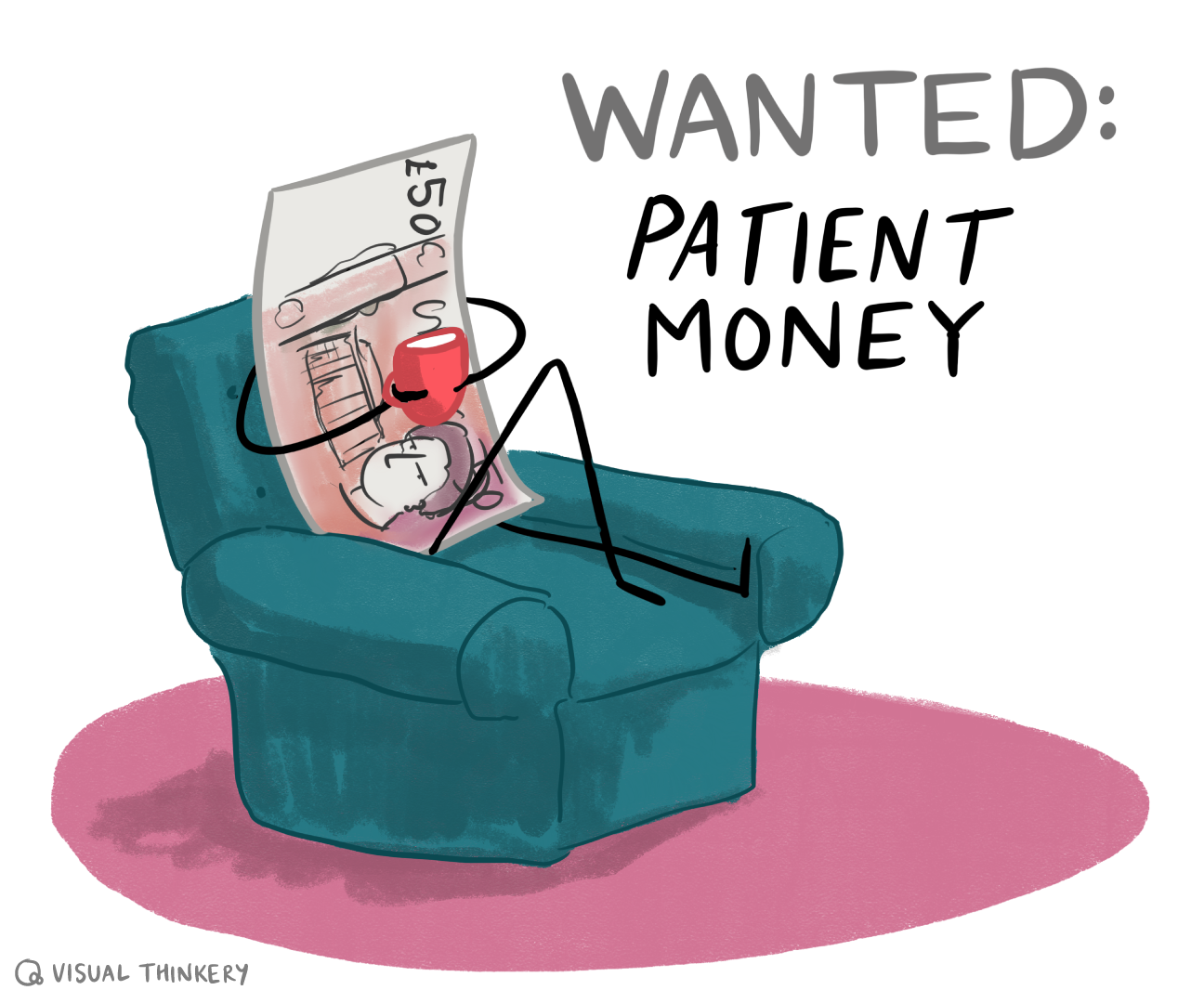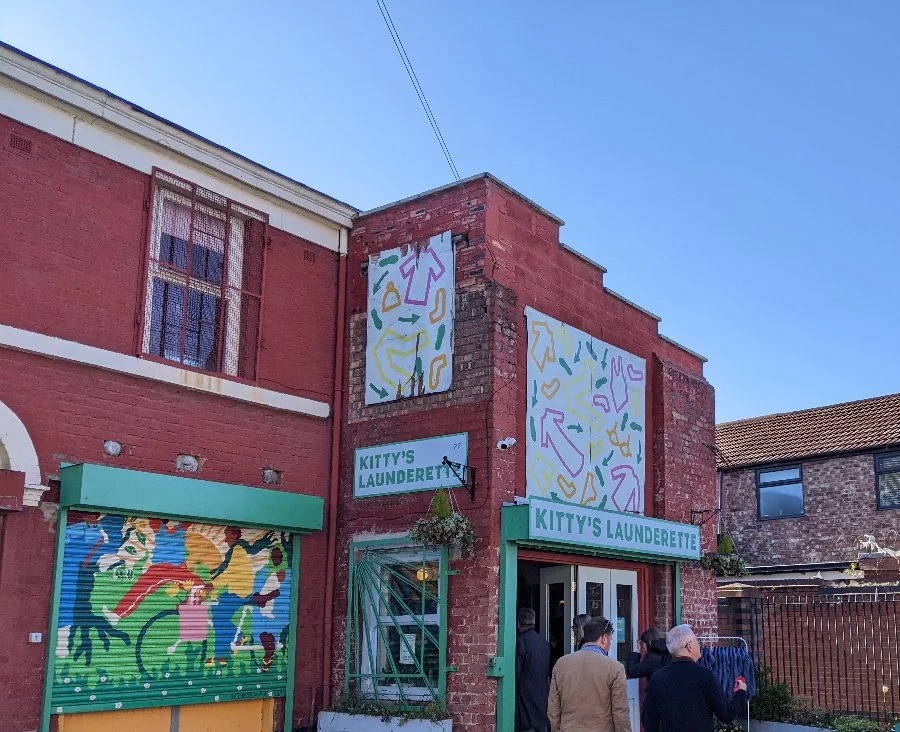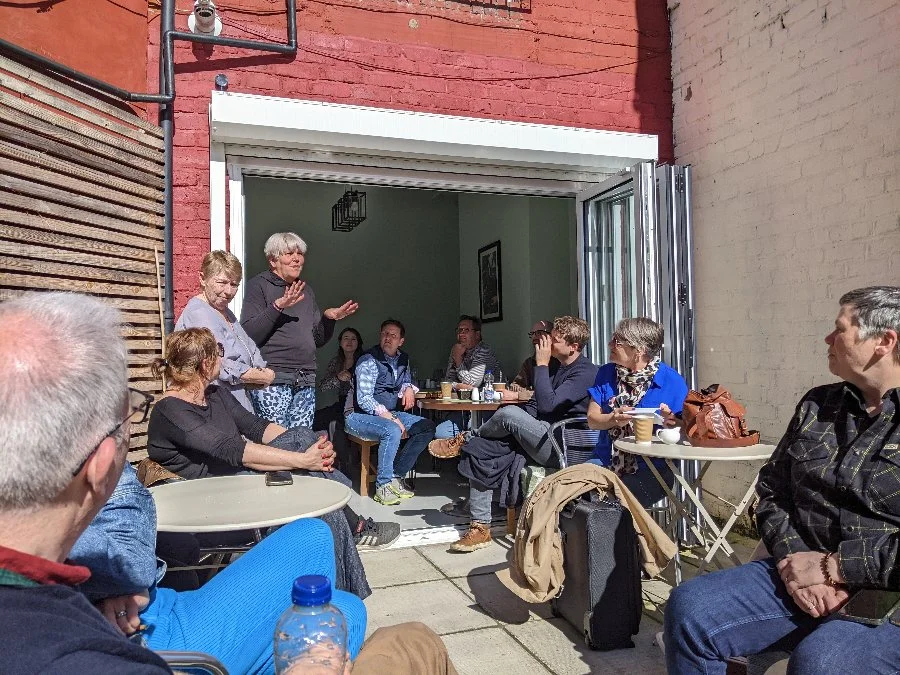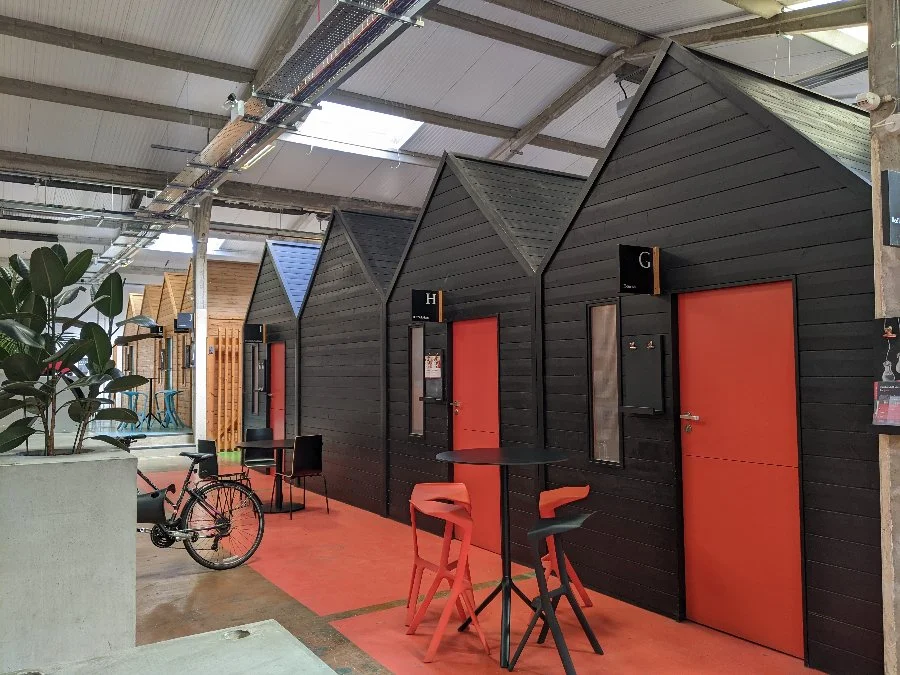Patient, Local, Relational Funds: Reviving town centres by supporting community business
Part 2 of our new blog series: ‘Community-powered property: 3 Learnings from Liverpool and the Wirral’
A thriving high street needs community businesses. In turn, these businesses need an investment ecosystem that values and waits for social (not just financial) return: one that provides a leg-up to unlock buildings and fill them with amazing, impactful ideas. Here’s how an initiative in the Liverpool City Region is getting it right…
Walk out of Liverpool Football Club’s home ground in Anfield, and the smell of freshly baked pies and a bright, playful façade draws you into Homebaked Bakery. It’s one of the neighbourhood’s few outlets offering fresh affordable food, popular with local people and visiting football fans alike. Run as a thriving cooperative business, the building (which was also a much-loved bakery in its previous life) was saved from demolition by the local community.
Nearby, tucked away just off the main street, a small team of Liverpool residents run the busy Kitty’s Launderette as a worker-community cooperative. Local people and businesses drop by for affordable, high-quality laundry services, and to gather, talk and learn in the welcoming social space.
Laundry AND community: Kitty’s Laundrette
Platform Places hears the story of Homebaked Bakery from the local Anfield women behind it
Community-powered uses of property like Homebaked and Kitty’s are key to generating vibrancy and footfall across our UK town centres in ways that serve local needs.
Yet a huge obstacle familiar to socially-trading organisations (STOs) like these is money. Money to get their ideas off the ground and to secure the physical space they need.
When Platform Places spent a day talking to numerous STOs across the Liverpool City Region, it quickly became clear that Kindred LCR has played an integral role in so many of their genesis, including Homebaked Bakery and Kitty’s, as well as Birkenhead’s Make Hamilton and Future Yard. Through patient, local and relational investment, Kindred is creating the conditions for STOs to thrive.
So what does it to take to provide this kind of investment? Here’s how others can follow Kindred’s lead:
1. Patient money, lasting impact
When STOs occupy town centre buildings for the long term, they give old space new purpose and identity, and can generate lasting social impact and economic benefit.
Patient investment waits for returns — including social return. It understands that STOs need time for further funds to get unlocked, and for business models to be tested so that they generate income while truly meeting local needs.
Patient investment also trusts STOs and the people behind them, acknowledging both the potential risks and returns that come with any kind of entrepreneurship. If we want our town centre buildings to be filled with amazing ideas at scale, then risk has to be valued and encouraged; STOs must be given the autonomy and opportunities to try out ideas.
In practice, patient investment may look like 0% interest and/or longer repayment terms. Kindred even offers some STOs the option to repay money partly in social value.
The power of early investment for long-term impact can be transformative. In Kindred’s origins as the Beautiful Ideas Company, they ran a Festival of Ideas to harness local entrepreneurship for social good. The festival provided small grants, funded through charges from match-day car parks, and created a space for local people to test and try their ideas, however small or partially formed. This platform became a foundational movement for local entrepreneurship and STO networks in the Liverpool City Region, and unlocked further funding for many businesses.
For Grace Harrison, founder of Kitty’s Laundrette, this trust and encouragement to ‘just try’ was key:
“The best thing about it was that we just needed to write a paragraph on our idea – we didn’t need a business plan yet.
We joined a programme of others with ideas – we learnt from each other. At the end of the programme, we pitched for £20,000 – which subsequently unlocked other funding, but crucially it built our confidence. We felt this was something we could actually do.
They gave you the money and trusted you get on with it at that early stage. There’s something so powerful about having the agency to decide how you use the money as your plans change and develop."
In contrast, another funder recently required Grace to spend six months working through an admin-heavy process to agree how to spend £11k of £20k on designated advisors.
2. Local, relational investment
Step onto the Baltic Triangle in Liverpool a dozen years ago, and its impressive historic buildings, once at the heart of the city’s trade activity, would have been abandoned. Visit today, and the streets are alive, doors swinging from day to night as local artists, musicians and young entrepreneurs come and go to co-work, create and meet up.
Kindred is based here, at the heart of the local STO and business community, in a building owned by Baltic Creative — the community interest company that’s brought multiple units to life for the local creative and digital sectors in the Baltic Triangle.
One of Baltic Creative’s workspaces
This physical embeddedness is more than symbolic. Kindred is a truly local investor that builds relationships and connections with the people whose ideas and businesses it supports. It places as much emphasis on its membership and peer-networking function as on its investment function.
It’s led by the needs, potential and creativity of Liverpool City Region’s local businesses, whilst creating the conditions for them to thrive, to collaborate and to reinvest their funds, knowledge and space locally.
When we asked how this approach works, local movement-maker and network-weaver Erika Rushton (who has played a pivotal role in both Kindred and Baltic Creative) told us:
"We call the support we give each other through Kindred ‘Collaborating Communities’ which means when many small businesses overcome their smallness by sharing things.
I think of Baltic Triangle as living proof that we can collectively build, and rebuild our own economies and don't have to wait for an inward investor, grant from Government, developer’s masterplan or the latest entrepreneurial saint. As they used to say on Blue Peter: ‘here’s one we made earlier’."
The fact that STOs are truly driven by local needs can be equally or more important than a full upfront commercial business plan — and local funders are often best placed to understand this.
Take Future Yard, who Kindred supported incrementally, first with investment and then with funding applications. In 2019, Future Yard put on a festival to test and confirm appetite for music in the Wirral. This gave the team something concrete to talk about with funders, eventually leading to a social investment loan from Nesta to buy their building.
This incremental investment has a funding domino effect that can move mountains, by derisking and building trust in STO investment for other funders. Kindred used a series of pilot projects to develop a proof-of-concept and attracted £5.5M funding from Mayor Steve Rotheram and the Liverpool City Region Combined Authority. This was with the help of Power to Change, who matched it with £1M and incubated Kindred throughout the set-up phase.
As Erika puts it:
“The economic evidence of our collective capability keeps on coming. In just 12 months, the STOs who had shared £1M collectively doubled their workforce from 80 to 160; doubled turnover from £1.9M to £3.8M; and levered another £10M into their social businesses. 80% of STOs are located in what some would call ‘left-behind communities’ (we think we are actually ‘way out front’).
We have brought 333,000 sq ft of underused space back into use, are responsible for 60% of that collective growth, and encouraged others to join in. We don’t even count their impact yet. Imagine what that impact looks like in 5 or 10 years time?”
Imagine if every high street in the UK saw tens of millions of pounds unlocked for community businesses, after giving just a few small grants to local people to test their ideas?
Empowering community businesses to revive town centre buildings
“Clustering STOs = greater impact”: this is how Erika and Kindred’s director Jennifer Van der Merwe described their ‘place-based methodology’ to our group.
Geographical clustering isn’t just important for network-building, peer support and giving multiple uses to vacant buildings. It creates something that’s larger than the sum of parts: an outsized return in the form of thriving high streets with footfall, vibrancy and a unique identity. Where the places we live, work, shop and gather address real local needs for the long-term, while providing an accessible route into the economy for those furthest from the labour market. Where asset owners and local authorities can demonstrate social, environmental and economic impact.
To get there, we need to normalise investment for social return, and develop stronger relational partnerships between community leaders, funders, local authorities and asset owners. Only then can change can happen at scale — only then can STOs across the country get support to unlock hundreds of town centre buildings and occupy them for the long term.
This piece is inspired by a Platform Places visit to Liverpool and the Wirral in April 2023. See what we got up to in our Twitter photo diary.
Read next:
Part 1: “The Unblocker”: The council's role in unlocking town centre property
Part 3: Sustainable high streets need solutions, not sacrifices




